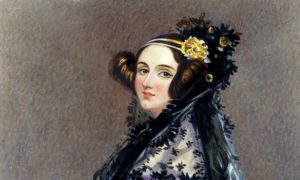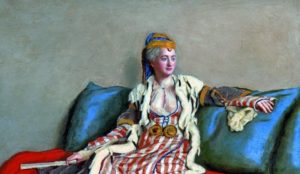British-born Gertrude Bell, also referred to as the female Lawrence of Arabia, was an adventurer, spy, archaeologist and powerful political force who travelled into the uncharted Arabian desert and was recruited by British Military Intelligence to help reshape the Middle East after World War I. She drew the borders of Iraq, helped install its first king and established the Baghdad Museum of Antiquities which was infamously looted during the 2003 American invasion. A true visionary, she advocated for Iraqi self-rule and openly criticized colonial policy.

Gertrude Bell was astonishingly accomplished. She was one of the most powerful women in the British Empire in the early twentieth century, yet she has been overlooked in much of the history written about this period. As the first female British intelligence Officer and adviser on Arabian affairs to the British government, Bell helped shape the geopolitical map of the world as it changed dramatically after World War I. She was the only woman with a diplomatic role at the Paris Peace Conference in 1919 and the only woman invited by Winston Churchill to the Cairo Conference in 1921.

It is a rare instance when her name or acknowledgement of her work makes it into contemporary culture. A recent biography on T.E. Lawrence doesn’t mention her name once, not even in a footnote. Not only were they colleagues from their days as archaeologists and worked together in the Arab Bureau in Cairo, but as General Gilbert Clayton, of the British Military Intelligence, stated, her maps of the Hejaz became of “signal use” in the famous Arab revolt. In the 1996 Academy award winning film, The English Patient, one of the characters talks about the “Bell Maps”—a reference to Gertrude Bell and her maps of remote and uncharted desert regions. This was exciting to hear—until the character in the film went on to refer to Bell as a “he.”
Gertrude herself commented with amusement on the assumptions of the day. In December 1920, now a Commander of the British Empire (CBE), her famous white paper “Review of the Civil Administration in Mesopotamia” was presented in both houses of parliament. To her parents she writes:
“I’ve just got Mother’s letter of Dec 15 saying there’s a fandango about my report. The general line taken by the press seems to be that it’s most remarkable that a dog should be able to stand up on its hind legs at all – ie a female write a white paper. I hope they’ll drop that source of wonder and pay attention to the report itself, if it will help them to understand what Mesopotamia is like. Gertrude Bell
Gertrude Bell (1868-1926) was part proper Victorian and part modern woman. The precocious daughter of a wealthy industrialist family from northern England, her life was a series of “firsts”:
- The first woman to receive highest honors in Modern History at Oxford;
- The first person to climb all the peaks of the Engelhörner range in the Swiss Alps, one of which is named after her: “Gertrude’s Peak;”
- The first woman to do a solo journey into the uncharted Arabian desert (she traveled by camel for 1500 miles across Central Arabia in 1914 and received the gold Founder’s Medal from the Royal Geographic Society);
- The first female Intelligence officer employed by the British Military

Her archaeological contributions were significant as well. As academic institutions did not support women in archaeology at that time, Bell had to organize and finance her own expeditions and collaborate with professionals for her work to be recognized. Her expertise and love of archaeology led her become a champion for Iraq. In 1925, she drafted the new progressive Law on Antiquities that formally established Iraq’s control over its vast archaeological treasures and established the Baghdad Museum. She also championed education for Muslim girls, helping to establish one of the most progressive educational systems in the Middle East. In remembering Gertrude Bell, renowned archaeologist Max Mallowan commented “no tigress could have safeguarded Iraq’s rights better.”
Gertrude Bell lived in Baghdad serving in the British administration and as Honorary Director of the Baghdad Museum until her death in 1926 at age 57 from an overdose of sleeping pills. It remains a mystery, and a subject of much debate, as to whether or not her death was intentional.
Letters from Baghdad: The Documentary
Letters from Baghdad will be a 90-minute documentary that follows Gertrude Bell’s unprecedented rise within the all-male ranks of British Military Intelligence to the inner sanctum of power, and will shine a light on the tangled history of Iraq through a remarkable personal narrative. The story will be told from the inside, with primary source materials including evocative archival footage of the period, the journals and writings of Bell and her contemporaries and her portfolio of more than 7,000 photographs. In celebration of Women’s History Month, Letters from Baghdad is launching a Kickstarter campaign with the theme Honor a Woman in your life. Please click here for more information about Gertrude Bell, the film and the Kickstarter campaign: http://lettersfrombaghdad.com
Featured image of Gertrude Bell courtesy Wikimedia Commons. All other images courtesy of the Gertrude Bell Archives, Newcastle University
Recommended Reading
Elizabeth Chandler is an Executive Producer of Letters From Baghdad, an upcoming documentary about Gertrude Bell. Check out Letters From Baghdad for more info, and to find out how you can help.







”She was the only woman with a diplomatic role at the Paris Peace Conference in 1919”. Not really. Queen Marie of Romania was an instrumental diplomatic representative of Romania at the Paris Peace Conference, and, even though she was an unofficial one, she had meetings with the likes of Clemenceau, Wilson, Poincaré etc. Her efforts deeply changed the situation of Romania.
I never heard of this amazing woman until I looked up Lawrence of Arabia and found her mentioned as his lover. It is interesting but not surprising that Gertrude Bell’s achievements have been largely ignored in British History.